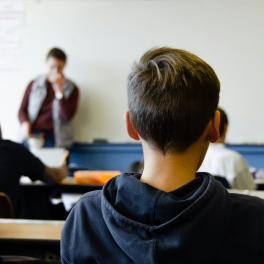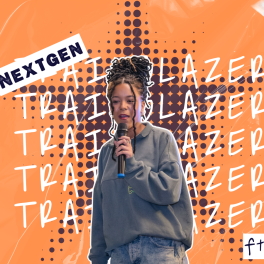
Over the past few years, conversation has grown about the presence of families on social media and the influence of family vlogging, particularly on children. The first couple of online generations jumped into social media all guns blazing, creating family vlogs which ranged from charming to downright unsettling, and posting so many baby photos that their Facebook pages look like a time-lapse video of their little angel growing up (with nothing left private).
The latest iterations of this conversation have revolved around the rights of the children who grow up as an integral part of family vlogging channels, and how best to compensate them for what is, ultimately, work. California's Child Content Creator Rights Act is giving children the right to the money they earn through monetised social media content they appear in, much like the child stars on TV and film, with 65% of their earnings being protected in a trust fund.
This law is not the first of its kind. Illinois got there first, and states like Ohio, Utah, and Minnesota are following suit in what will hopefully lead to nationwide protections for child content creators.
An Updated Look at Financial Protection for ‘Child Stars’?
Under California’s new law, if a child appears in more than 30% of a channel’s monetised content, and that channel earns more $1,250 a month, 65% of the child’s proportionate share of those earnings (meaning percentage of the video the child appears in) must be set aside in a trust for them. This is particularly relevant to some family vloggers, where it’s apparent they rely on, or even exploit, their children for clicks and views, despite some framing their content as a charming or ‘educational’ peek into family life. The law goes beyond parent/child dynamics, and will be relevant to all family content, meaning even children who appear in videos made by extended family (like aunts, uncles and older siblings) are entitled to compensation.
‘“Family” means a group of persons related by blood or marriage, including civil partnerships, or whose close relationship with each other is considered equivalent to a family relationship by the individuals.’ – California Senate Bill No. 764, Part 2.5
Some existing contracts between a minor and their parent remain in place, provided the contract is as beneficial to the child as the Child Content Creator Rights Act.
Are Family Vloggers Really Leaving California?
Rumours are flying that some family vloggers are quite literally fleeing the law by moving to states like Tennessee. Notable is the LaBrant family, who moved to Tennessee in 2023 – the same year the Child Content Creator Rights Act was drafted. Similarly, Christian family vlogger Cecily Bauchmann, who enjoys a following of over 2 million on TikTok, moved her family to Tennessee, where she posts videos about life as a mum of four.
But it’s the Xavier family, who post about family life and clean eating, raising the most eyebrows among critics. The parents moved with their son and two daughters to Tennessee from California earlier this year after allegedly finding mold in their L.A. home. The matriarch, Brittany Xavier, has 5.1 million TikTok followers, and a quick scroll shows her children featured in almost every thumbnail. Staying in California would likely have put a big dent in her income.
Whether these families relocated due to concerns about the law's impact on their income or for unrelated reasons remains unclear, but the timing of their moves is noteworthy.
Reaching Europe
There is no current legislation protecting child influencers from financial exploitation in the UK. General child welfare and labor laws exist, but don’t adequately cover the digital influencer context, particularly the financial aspect. The Online Safety Act only protects children as consumers of online content, with no consideration for children as performers. A 2022 Government Response to the DCMS Influencer Culture Enquiry acknowledged the regulatory gap in protecting child influencers and ensuring they have suitable work conditions. No legislation to address this issue has been passed since.
France was the first country to implement legislation protecting child influencers in 2020. The law regulates the hours under-16s work as an influencer and what happens to their earnings, and it also gives children the right to be forgotten, meaning platforms are obliged to remove content at the child’s request.
In Ireland, the Children’s Ombudsman called for new laws this month (April 2025) to protect child influencers from exploitation by parents and commercial brands, while Dr Francis Rees of Essex Law School, originally from Dublin, has drawn up a new digital safeguarding toolkit to protect child influencers and limit the harm caused to their education, dignity and privacy.
She identified a range of harms from kidfluencing, including school attendance and lack of employment benefits such as financial remuneration, controlled working hours, and health and safety measures. Her framework is launching in Dublin next month (May 2025).
Baby’s First Instagram
Child influencers may be the most visible on social media, but they're far from the only children with an online presence. By the age of 13, a child in the UK has around 1,300 photos and videos posted by parents on social media. Of course, almost all of these are well-intentioned. Most of the time, it’s simply well-meaning families who are proud of their children and want to share that online.
Even harmless sharing, however, raises privacy issues. Parents who don’t have private social media accounts risk anonymous users accessing photos and videos of their children, and in the era of deep fakes, Photoshop, and boundless internet creeps, that could spell trouble.
“I asked her to remove photos, but she refused, insisting there was nothing wrong with them. She wanted to share her memories of being with me, she said, and I should stop feeling ashamed. Already feeling out of control and full of teenage hormones, I was never satisfied with this answer – so we ended up having arguments, which resulted in me unfriending her on Facebook far more often than I’d like to admit. It’s strange to unfriend your mother - but sometimes you need to.” – VoiceBox creator, ‘Should parents ask permission before posting about their children?’
Mummy’s Little Superstar
There’s a fine line between ‘sharenting’ and family vlogging, and many family vloggers begin their journey innocently. You can easily imagine that, after a random TikTok video of your baby doing something cute goes viral, the temptation to recapture that five seconds of fame becomes addictive. Before you know it, you’re doing a baby food review sponsored by Gerber and launching your line of onesies. Once a nice little family social media account starts to make some money, it’s very easy for things to slip into uncomfortable territory, where the children’s well-being is no longer the top priority.
Many have pointed out instances in which very young children are seen performing influencer-like behaviours on camera, such as instinctively holding products so the branding faces the lens, or tapping their nails on the containers as they show them off. These moments have drawn criticism, as they suggest that children are being coached to act as influencers rather than simply being able to behave as kids.
“Adultifying your child will cripple her in the future. Let her be a kid, not a 20-year-old ‘influencer.’” - TikTok Commenter
Our previous article on family vloggers covered a channel called FamilyOFive, which uploaded a spate of YouTube videos falsely accusing the youngest member of poor behaviour, cursing at him, and smashing his electronics (under the guise of a ‘hilarious’ prank). The harmful formula of upsetting their children and provoking an intense reaction made them a lot of money, enough to profit and repeat without a second thought of the effect on their young family. The parents were convicted of child neglect and lost custody of two of the children. While they represent an extreme case of family vlogging going to dark places, such instances are far too common.
In some cases, children become victims of extreme abuse, like the 8 Passengers family, whose authoritarian parenting resulted in one malnourished child climbing out a window and running away with duct tape on his ankles. The mother, Ruby Franke, was sentenced to four years in prison for child abuse.
Other parents have even been accused of bringing children into their family for cash grabs and business opportunities, like the Stauffer family, who ‘gave up’ their adopted son from China, citing his ‘behavioural issues’. Many were outraged that the parents ‘rehomed’ their child, and the family have since deleted their YouTube channel. Whether or not these parents were truly well-intentioned and just couldn’t handle the enormous responsibility of adoption is up for debate, but posting the whole saga online tinged the situation with a sense of exploitation.
‘If the channel couldn't make money without the kids, it's exploitative.’ – Reddit user
All Grown Up
‘Original’ child influencers – the ones whose parents found fame on Facebook and YouTube – are now in their mid to late 20s. Many have spoken up about the harm caused to them throughout their childhood and beyond.
Cam Barrett’s mother documented everything online, from first periods to car accidents, to school rewards and failures. The content was rewarded with celebrity attention and perks, but for a price. Cam was bullied in school, suffered from anxiety and hid in their room to avoid the camera. The relationship with their mother has since broken down.
Shari Franke, the daughter of Ruby Franke from 8 Passengers, has subsequently written a book about her time as a child influencer and the hidden abuse she suffered at the hands of her mother. She is open in her telling of the 8 Passengers' journey, and the family’s involvement with relationship coach Jodi Hildebrandt, who encouraged Ruby to implement an ‘inhumane and merciless’ disciplinary regime.
‘I wondered how the public's consumption of others' pain and suffering cross the line from empathy to voyeurism. How quickly have we, as a society, become numb to the struggles of others, our capacity for compassion eroded by the sheer volume of human drama we're exposed to daily? We were just characters in a soap opera now, except the drama was real, and the consequences permanent. Our grief had been reduced to a mere commodity, packaged and sold, consumed and discarded.’ – Shari Franke, 'The House of My Mother'
Another grown-up child influencer took to Reddit a couple of years ago to explain how family vlogging deeply harmed their well-being. The anonymous user said they initially enjoyed being the centre of attention and receiving presents, but they only got parental recognition when the camera was on, and they only received toys when they performed in the right way.
“My siblings and I were so paranoid there were cameras on us that the only place we felt comfortable changing was in the bathroom with the lights off. Someone attempted to kidnap my sister and found it easy because they knew her full name, address, school and details about her. My sister didn’t know he was a stranger because he knew so much about her.” – Grown-up child influencer
In a similar case, ‘Clair’, a 17-year-old child influencer who had endured a lifetime in front of the camera, spoke of stress from supporting her family financially when her parents quit their jobs to do YouTube full-time. When she told her dad she didn’t want to be in videos, he told her they would have to give up their house, and there would be no money for ‘nice things.’ Clair considered going no contact with her parents when she turned 18.
‘I think the vast majority of family vloggers are either oblivious to the damage they’re doing to their kids or too narcissistic to care. Imagine trying to navigate school while your every mistake, tantrum, disappointment and family occasion is plastered all over social media for everyone to see. I suppose that’s why so many of these kids are homeschooled. It’s a great way to blind them to the fact that other kids don’t live the way they do and keep them compliant’ – Reddit user
Conclusion
Sharing family moments online can be a wonderful way for parents to celebrate their kids and connect with others. But there’s a fine line between sharing and exploiting when content prioritises engagement algorithms and brand deals over a child’s autonomy, privacy, and emotional well-being. Sadly, many family vloggers lose sight of their primary role as protectors once fame and money enter the equation, which exposes children to long-term harm. Although laws such as the Child Content Creator Rights Act mark progress in financial safeguards, they address only part of the problem. True protection demands rethinking how we value children’s digital footprints; their right to consent to being filmed, to erase content they later regret, and to simply exist offline without being monetised.
Support Young Creators Like This One!
VoiceBox is a platform built to help young creators thrive. We believe that sharing thoughtful, high-quality content deserves pay even if your audience isn’t 100,000 strong.
But here's the thing: while you enjoy free content, our young contributors from all over the world are fairly compensated for their work. To keep this up, we need your help.
Will you join our community of supporters?
Your donation, no matter the size, makes a real difference. It allows us to:
- Compensate young creators for their work
- Maintain a safe, ad-free environment
- Continue providing high-quality, free content, including research reports and insights into youth issues
- Highlight youth voices and unique perspectives from cultures around the world
Your generosity fuels our mission! By supporting VoiceBox, you are directly supporting young people and showing that you value what they have to say.





